Elon Musk and Donald Trump have had a dynamic and evolving relationship over the years, transitioning from adversaries to close political allies. Initially, during the lead-up to the 2016 presidential election, Musk expressed skepticism about Trump’s suitability for the presidency, stating that Trump “doesn’t seem to have the sort of character that reflects well on the United States.” He publicly backed Hillary Clinton’s policies, particularly on economic and environmental issues. However, upon Trump’s election victory, Musk was appointed to two of Trump’s economic advisory councils, a move that attracted backlash but was defended by Musk as an opportunity to influence policy from within. Yet, this collaboration was short-lived, as Musk resigned from the advisory boards in protest after Trump’s controversial decision to withdraw from the Paris Agreement in June 2017.
Over the next few years, the relationship between Musk and Trump fluctuated. In early 2020, amidst the COVID-19 pandemic, Trump praised Musk’s achievements and the success of Tesla, referring to him as “one of our great geniuses.” This period marked a shift where Trump publicly supported Musk in his struggles with California’s pandemic restrictions, reinforcing Musk’s position within Trump’s circle. The tide seemed to turn later that year when Musk stated that Trump should not seek another presidential term, a sentiment that did not sit well with the former president. Following this, a more critical Trump labeled Musk a “bullshit artist,” claiming Musk went back on his word about voting for him.
As time passed, Musk’s stance began to realign with Trump’s political agenda, especially as tensions eased between the two men. By 2023, Musk was openly supporting Trump’s return to social media and signaling interest in restoring Trump’s account on Twitter, which had been banned after the Capitol riots. He further aligned with Trump’s positions on issues such as immigration, openly calling for the reinstatement of a border wall during a live-streamed visit to the US-Mexico border. This indicated a clear ideological shift where Musk began to echo Trump’s positions on significant policy matters, suggesting his growing alignment with conservative values.
In 2024, as Trump launched his campaign for another presidential bid, the relationship transformed into a more overt political alliance. Musk was seen participating in Trump’s rallies and openly advocating for his campaign. He expressed enthusiasm about potentially serving in Trump’s cabinet, specifically in a proposed “Department of Government Efficiency” after voicing a desire to reduce government waste and inefficiency. Musk’s active involvement included significant financial contributions to pro-Trump Super PACs, with reports of donations amounting to millions, clearly indicating his commitment to Trump’s political objectives.
As the election unfolded, Musk’s prominence in Trump’s campaign became increasingly visible. His participation in campaign events, along with promotions of Trump’s policy goals, helped to amplify the former president’s messaging. A notable instance was Musk’s endorsement coming just after Trump faced an assassination attempt, reflecting a deeper political commitment. Following Trump’s 2024 election victory, Musk was officially appointed to lead the newly established Department of Government Efficiency. Their partnership marked a distinct shift in Musk’s public political identity, as he publicly transitioned from a once-critical observer to a loyal supporter within MAGA circles.
By late 2024, the Musk-Trump relationship had developed into a close friendship, with Musk being described as a confidant to Trump. Their collaboration extended beyond political strategy to personal friendships, evidenced by Musk’s participation in family gatherings and golf outings with Trump. Their dynamic represents a significant convergence of Silicon Valley and conservative politics, blending Musk’s industrial innovation and Trump’s populism. As they work together in governing efforts, the Musk-Trump alliance signals a new chapter in the intersection of technology and politics, potentially reshaping the landscape for both figures in the years to come.

